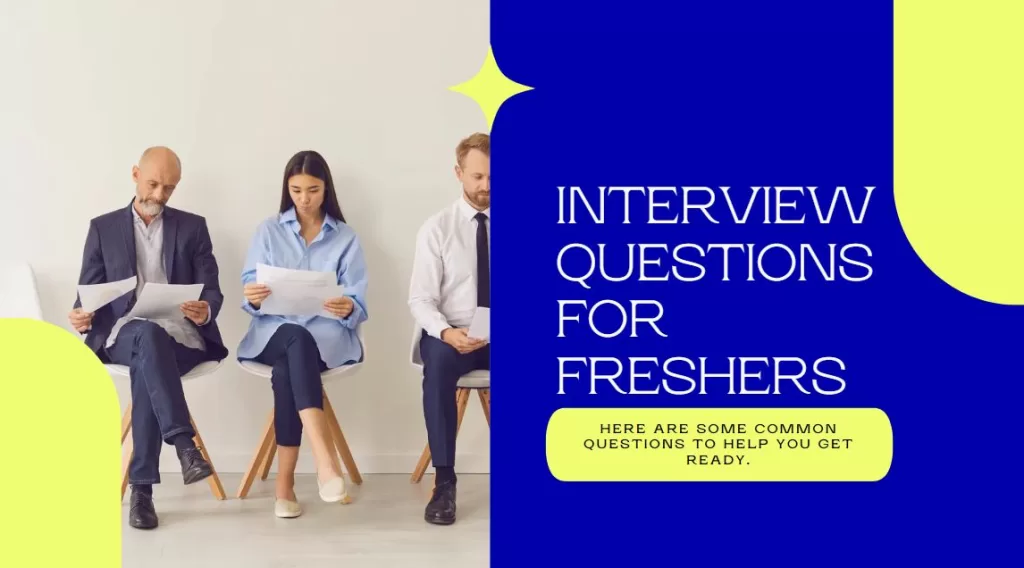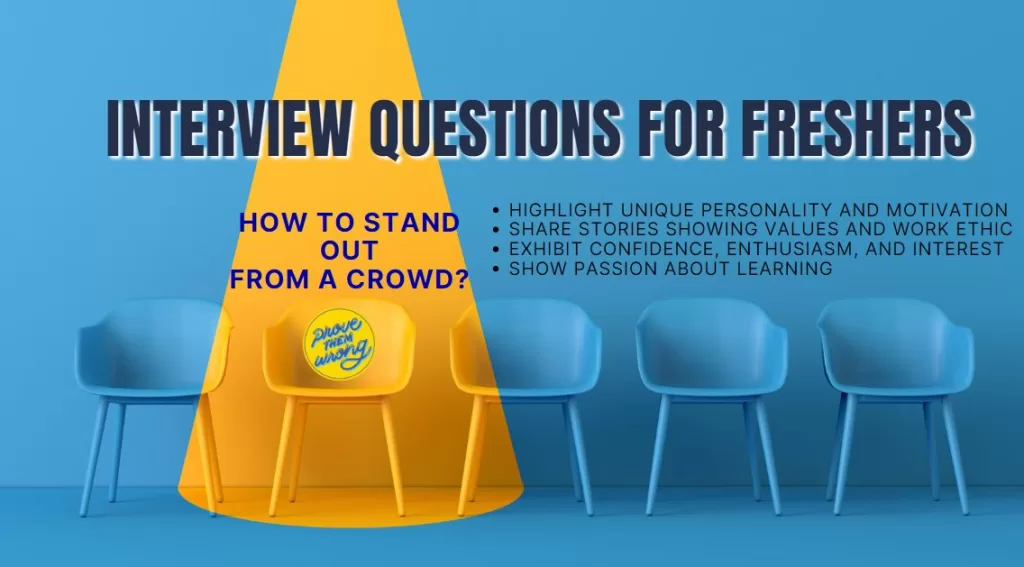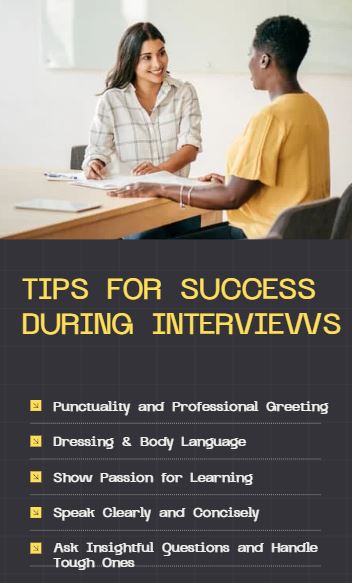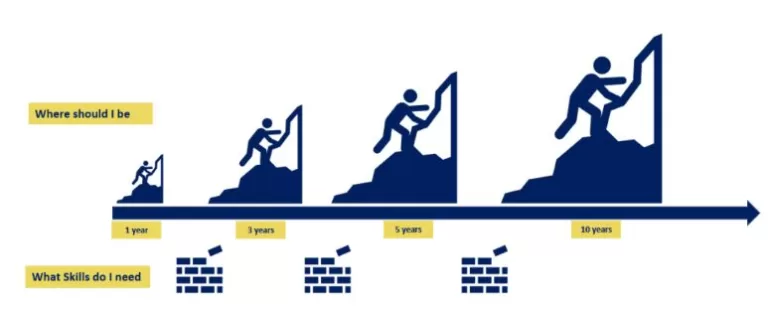20 Powerful Interview Questions For Freshers – How To Crack First Job Interview

Getting your first job after graduation or entering the workforce as a fresher can be a daunting experience, but it’s also exciting. A key step in the process of securing your first job is acing your job interview. As we step into 2023, the job market is becoming increasingly competitive and standing out in a sea of other candidates has never been more important.
In this article, we will guide you through the process of preparing for and acing your first job interview in 2023. Whether you’re a recent graduate or entering the workforce for the first time, we’ve got you covered with tips and tricks to help you impress your potential employer and land your dream job.
Note: We’ve also added 20 sample Interview questions for freshers with some answers for inspiration. Use them, but make sure you come across as authentic. Interviewers can smell a copy/paste answer from miles away.
Standing Out from the Crowd

Getting noticed in job interviews means letting your personality and drive shine through. As a new grad, you’re probably on par with your classmates in grades and skills. But what makes you different is your personal spark and zest for the job.
Interviewers want more than just skill; they’re after someone with a positive outlook, who gels with the team and really wants to do well. Letting your individuality and keenness show is your ticket to making a lasting impression.
Quick Tips to Show Who You Are
Tell Your Stories: Share personal tales that show your principles and dedication. Maybe you tackled a tough project with creative flair, or you helped someone out big time. These stories can show off how you think on your feet and play well with others.
Be Bold and Excited: Show you’re excited about the job and ready to dive in. Speak up, make eye contact, and stay relaxed. This tells them you’re interested and not just going through the motions.
Ask Smart Questions: Show you’re keen by asking about the company’s vibe, how the team ticks, or what the job’s really about. It shows you’ve done your homework and you’re seriously considering the role.
Stand Out Examples
Make a Portfolio: If you’ve got projects or work experience under your belt, put together a portfolio. It’s a solid way to show what you can do.
Share Your Enthusiasm for the Field: If you love the industry, let it show! Chat about the latest trends or news that’s grabbed your interest.
Solve Problems Out Loud: Employers love a good problem-solver. Give examples from when you’ve figured out tough challenges.
Team Player Wins: Most jobs need you to work with others. Share stories where you’ve teamed up successfully and achieved something together.
Here are some helpful job interview related blogs
- Tackling the final interview round
- How to answer ‘tell me about yourself’
- What are your career aspirations
- Why do you want this job
- Why should we hire you
- Why are you leaving your job
- What are you passionate about
- Strengths and Weaknesses In Interview
- Interview questions for managers
- What is your management style
- Interview questions for freshers
- Tips to succeed in a job interview
- Types of interview questions
- Interview questions to ask candidates
- Behavioural interview questions
- Walk me through your resume
- What makes you unique
- What are your goals
- How do you handle stress and pressure
- Are you a team player
- How did you hear about this position
- Where do you see yourself in five years
- How do you handle stakeholders
Preparation Before the Interview

Research the company and the position
A good research can help you determine whether the company is a good fit for you and give you a sense of what the interviewers might be looking for in a candidate.
How to find information about the company and its culture
- Begin with the company’s official website and explore their social media profiles for updates and company culture.
- Look up recent news articles to understand the company’s latest developments, projects, and community initiatives.
- Use employer review platforms such as Glassdoor to gauge the experiences and opinions of current and past employees.
How to tailor your resume and cover letter to the position
In most cases, the resume is already with the employer. If you have the opportunity to present resume at the time of interview, then consider the following.
- After researching the company and role, modify your resume and cover letter specifically for the job.
- Highlight your skills and experiences that align closely with the job’s requirements.
- Make sure to weave in relevant keywords from the job description to demonstrate your understanding of the role’s demands.
Practice common interview questions
Behavioral interview questions are designed to assess how you’ve handled specific situations in the past. To prepare for these questions, think of examples from your past work or academic experience that demonstrate skills or qualities that would be relevant to the current job here. Use the STAR method to structure your answers and be prepared to explain the thought process behind your actions.
Use the 20+ examples provided in the final section for inspiration.
Here’s more
- Tackling the final interview round
- How to answer ‘tell me about yourself’
- What are your career aspirations
- Why do you want this job
- Why should we hire you
- What are you passionate about
- Strengths and Weaknesses In Interview
- Interview questions for managers
- Interview questions for freshers
- Tips to succeed in a job interview
Choose appropriate attire and practice good hygiene
What you wear to an interview can make a big difference in how you are perceived. It’s important to choose appropriate attire that is professional and reflects the culture of the company. If you’re not sure what to wear, research the company culture and dress code beforehand.
In addition to dressing appropriately, it’s important to practice good hygiene. Make sure you shower, brush your teeth, and wear deodorant before the interview. Keep your nails trimmed and clean, and avoid wearing too much perfume or cologne. If you have facial hair, make sure it is well-groomed and neat.
If you have to risk it, then risk being over-dressed than under-dressed.
During the Interview

The interview itself is the most crucial part of the job search process. It’s the chance for the interviewer to get to know you and for you to showcase your skills, personality, and motivation. Here are some tips for making a great impression during the interview:
Making a good first impression
Importance of punctuality and greeting the interviewer professionally
Arrive on time, preferably a few minutes early, to show that you are reliable and respect the interviewer’s time. Greet the interviewer professionally with a firm handshake and maintain eye contact throughout the interview.
Tips for appropriate attire and body language
Dress professionally and conservatively, according to the company’s dress code. Practice good posture, avoid fidgeting, and maintain eye contact. These nonverbal cues convey confidence and professionalism.
Communication skills
How to listen actively and respond thoughtfully
Listen carefully to the interviewer’s questions and take a moment to formulate your responses. Respond thoughtfully, using specific examples from your experiences to illustrate your skills and accomplishments. Avoid rambling or providing irrelevant information.
How to use specific examples to illustrate your skills and accomplishments
Use the STAR method (Situation, Task, Action, Result) to structure your responses to behavioral interview questions. This method helps you provide specific examples from your past experiences to demonstrate your skills and accomplishments.
Asking thoughtful questions
How to prepare for questions about the company and the position
Research the company and the position beforehand and prepare questions that demonstrate your interest and knowledge. Avoid asking generic or easily answered questions, and focus on questions that demonstrate your enthusiasm and fit for the position.
Examples of questions to ask
Ask questions about the company culture, team dynamics, and the day-to-day responsibilities of the position. You can also ask about the company’s long-term goals and the potential for growth and development within the company.
Handling difficult questions
How to remain calm and composed during challenging questions
Take a moment to collect your thoughts and respond calmly and professionally. Don’t get defensive or confrontational, and avoid speaking negatively about previous employers or experiences.
Strategies for responding to unexpected or uncomfortable questions
Redirect the conversation to a positive aspect of your experience or skills. If the question or right or wrong answer is inappropriate or irrelevant, politely decline to answer or provide a general response that redirects the conversation back to your qualifications for the position.
Overall, remember to be confident, enthusiastic, and professional during the interview. Practice active listening, respond thoughtfully and with specific examples, and ask thoughtful questions. And don’t forget to handle difficult questions with grace and professionalism.
After the Interview
After the interview, it’s important to take a few key steps to help improve your chances of landing the job. Here are some tips on what to do after the interview:
Follow-up with a thank-you note
Following up with a thank-you note is an important part of the interview process. Not only does it show your appreciation for the interviewer’s time, but it’s also an opportunity to reiterate your interest in the position and reinforce your qualifications. Here are some tips for crafting an effective thank-you note:
Importance of expressing gratitude and reinforcing interest in the position
Expressing your gratitude is an important aspect of the thank-you note. You should start your message by thanking the interviewer for their time and for considering you for the position. You can also use this opportunity to reinforce your interest in the position and the company.
Tips for crafting an effective thank-you note
To create an effective thank-you note, you should keep it short, sweet, and to the point. Be sure to address the interviewer by name and include specific details from the interview to show that you were paying attention. You can also highlight any relevant skills or experiences that you didn’t have a chance to mention during the interview.
Reflect on your performance and learn from the experience
After the interview, it’s important to reflect on your performance and identify areas for improvement. Here are some tips for evaluating your performance:
How to evaluate your performance and identify areas for improvement
Take some time to reflect on your performance during the interview. Think about the questions you were asked and how you responded. Consider what went well and what you could have done differently. Identify any areas where you felt unprepared or lacked confidence, and think about how you can improve your performance in these areas in the future.
Tips for incorporating feedback into future interviews
If you received feedback from the interviewer, use it to improve your performance in future job interviews. Pay attention to any areas where you were told you could improve and think about how you can work on those skills. If you weren’t given any feedback, consider reaching out to the interviewer to ask for some constructive criticism.
Patience and perseverance
It’s important to remember that the job search process can be a long and challenging journey. Here are some tips for staying motivated and continuing the job search:
How to handle rejection and maintain a positive attitude
Rejection is a natural part of the job search process. It’s important to remember that it’s not a reflection of your worth as a person or a professional. Take some time to process your feelings, but don’t let it get you down. Stay positive and keep pushing forward.
Strategies for staying motivated and continuing the job search
Staying motivated during the job search process can be tough, but there are strategies you can use to keep yourself moving forward. Set small, achievable goals for yourself and celebrate each accomplishment. Connect with other job seekers and professionals in your field for support and advice. And remember to take care of yourself both physically and mentally.
Get a career coach if you need one. They can help you prepare for handling the interview questions and help you manage the stress that comes with your first interview. They can also help you through your career.
Commonly asked fresher interview questions and answers
1- Tell me about yourself
One of the most common questions asked by interviewers is “Tell me about yourself.” This question may seem straightforward, but it can be tricky to answer since it is an open-ended question that can be interpreted in different ways.
The interviewer is looking for an opportunity to get to know the candidate better and to evaluate if their skills and interests align with the position.
When answering this question, it’s essential to keep the focus on your professional experience and accomplishments rather than your personal life. Start by providing a brief overview of your background and qualifications.
This can include your educational background, any relevant work experience, and your technical or soft skills. You can also highlight any relevant achievements or awards that demonstrate your expertise.
It’s important to tailor your answer to the position you are applying for. Highlight the skills and experience that are relevant to the job and demonstrate how they make you a good fit for the position. This is an opportunity to showcase your unique strengths and qualifications that make you stand out from other candidates.
When preparing your answer, be mindful of the tone and language you use. Be confident and enthusiastic in your delivery, but also ensure that you are not coming across as too boastful or arrogant. Keep in mind that the interviewer is looking for a candidate who is both qualified and a good fit for the company culture.
A sample answer to this question could be: “I recently graduated from XYZ University with a degree in computer science. During my time in college, I worked on several programming projects and completed internships at ABC Company and DEF Inc. I am passionate about coding and problem-solving, and I am excited about the opportunity to apply my skills to this position. In my previous experience, I have demonstrated my ability to work collaboratively in a team and to take on new challenges with a positive attitude. I believe my technical skills and passion for the industry make me a strong fit for this role.”
2- Why do you want to work for our company?
During a job interview, one question that candidates may face is “Why do you want to work for our company?” The interviewer is essentially asking about the candidate’s motivation for pursuing the job opening and working for the company. By asking this question, employers want to know whether the candidate has done their research about the company and whether they are genuinely interested in the position.
In response to this question, candidates should highlight what they know about the company and how their values and career goals align with the company’s mission and culture. A good answer would demonstrate the candidate’s understanding of the company’s core values, recent achievements, and future goals.
A sample answer to this question could be: “I am highly impressed with your company’s commitment to innovation and your contributions to the community. As someone who is passionate about making a positive impact through my work, I believe that your mission to provide sustainable solutions to complex problems aligns with my values and interests.
After conducting extensive research on the company, I am excited about the prospect of joining a team of highly skilled professionals who share my passion for excellence. I believe that working for your company would provide an excellent opportunity for me to grow and develop my skills, while contributing to your success.”
By highlighting their knowledge and enthusiasm for the company and the position, candidates can demonstrate their motivation and suitability for the job. This type of answer can make a strong impression on the interviewer and increase the chances of landing the job.
3- What are your strengths and weaknesses?
Why interviewers ask this question: This question allows interviewers to assess the candidate’s self-awareness and to determine if their strengths and weaknesses align with the job requirements.
Sample answer: “My greatest strength is my ability to collaborate effectively with others. I enjoy working in teams and am able to communicate clearly and openly. As for my weaknesses, I tend to be a perfectionist and can sometimes spend too much time on minor details. I am aware of this and have been working on improving my time-management skills.”
4- What is your greatest achievement?
Why interviewers ask this question: This question provides insight into the candidate’s accomplishments and demonstrates their potential for success.
Sample answer: “My greatest achievement was completing a group project for my senior capstone course. Our team worked together to develop a web application that helped local businesses manage their inventory more efficiently. We received an A for the project, and our application was used by several businesses in the community.”
5- Why did you choose this field of work?
Why interviewers ask this question: This question helps interviewers understand the candidate’s motivations and whether their interests align with the job requirements.
Sample answer: “I have always been interested in technology and its potential to improve people’s lives. During my high school years, I became fascinated with programming and decided to pursue a degree in computer science. I am excited about the opportunity to apply my skills and knowledge to real-world problems.”
6- What experience do you have in this field?
Why interviewers ask this question: This question assesses whether the candidate has relevant experience in the field and whether they have the skills required for the job.
Sample answer: “During my time in college, I completed several programming projects and internships that gave me experience in developing web applications, working with databases, and using different programming languages. I also participated in coding competitions and hackathons, which helped me develop my problem-solving skills.”
7- What do you know about our company?
Why interviewers ask this question: This question helps interviewers assess the candidate’s research skills and whether they are interested in the company.
Sample answer: “I have researched your company and learned that you specialize in developing software for the healthcare industry. Your products have been instrumental in improving patient outcomes and reducing healthcare costs. I am impressed with your commitment to innovation and look forward to contributing to your mission.”
8- What are your salary expectations?
Why interviewers asks the question: The interviewer wants to know your salary expectations to assess whether your expectations align with the company and hiring manager’s budget for the position.
Sample answer: “As a recent graduate, my priority is to gain experience and develop my skills. I am open to discussing a salary that is reasonable and fair for the position and reflects my qualifications.”
9- What motivates you?
Why interviewers asks the question: The interviewer wants to understand what drives and inspires you as a candidate, and how it aligns with the company’s values and culture.
Sample answer: “I am motivated by the opportunity to learn and grow in a challenging work environment. I am passionate about using my skills and knowledge to make a positive impact on the organization and contribute to its success.”
10- How do you handle pressure and deadlines?
Why interviewers asks the question: The interviewer wants to know how you deal with stress and tight deadlines, which are common in many job roles.
Sample answer: “I thrive under pressure and I believe it helps me stay focused and perform at my best. To manage deadlines effectively, I prioritize tasks, break them down into smaller steps, and communicate any concerns or roadblocks with my team.”
11- What are your long-term career goals?
Why interviewers asks the question: The interviewer wants to understand your aspirations and how they fit with the company’s goals and opportunities for growth.
Sample answer: “My long-term career goal is to become an expert in my field and take on more leadership responsibilities. I am excited about the potential to grow within this company and develop my skills in areas such as project management and team leadership.”
12- What are your strengths and weaknesses?
Why interviewers asks the question: The interviewer wants to understand your self-awareness and how you can contribute to the company’s success while also identifying areas for improvement.
Sample answer: “One of my strengths is my ability to collaborate effectively with others and build strong relationships. One area where I am working to improve is my public speaking skills, so I have been attending workshops and seeking feedback to help me improve.”
13- How do you handle criticism?
Why interviewers asks the question: The interviewer wants to understand your ability to accept feedback and use it constructively to improve your work.
Sample answer: “I appreciate constructive criticism as an opportunity to learn and grow. I take the feedback seriously and use it to identify areas for improvement and develop strategies to address them.”
14- What are your hobbies or interests outside of work?
Why interviewers asks the question: The first interviewer asks and wants to understand your personality and how you spend your time outside of work.
Sample answer: “In my free time, I enjoy playing sports and volunteering with local organizations. I find that these activities help me maintain a healthy work-life balance and develop skills such as teamwork and leadership that are transferable to my career.”
15- How do you handle conflicts with coworkers or supervisors?
Why interviewers asks the question: The interviewer wants to understand your conflict resolution skills and how you handle difficult situations in the workplace.
Sample answer: “I try to approach conflicts with an open mind and a willingness to listen to all perspectives. I strive to find a mutually beneficial solution and seek guidance from a supervisor or mentor if needed.”
16- Why do you want to work for this company?
Why interviewers asks the question: The interviewer wants to understand your motivation for applying to this specific job offer, company and how well you have researched the company.
Sample answer: “I am impressed by the company’s commitment to innovation and its strong reputation in the industry. I believe that my skills and experience align well with the company’s values and mission, and I am excited about the potential to contribute to its success.”
17- How do you handle stress and pressure?
Why interviewers ask this question: This question aims to assess your ability to handle challenging situations and stay calm under pressure.
Sample answer: “When I encounter stressful situations, I try to maintain a positive attitude and stay focused on the task at hand. I also prioritize my tasks and make a to-do list to ensure I complete everything on time. I find that taking a quick break to do some breathing exercises or take a short walk helps me clear my mind and regain focus.”
18- How do you handle constructive criticism?
Why interviewers ask this question: This question aims to evaluate your ability to take feedback and improve your performance.
Sample answer: “I welcome constructive criticism as an opportunity for growth and improvement. When receiving feedback, I try to stay objective and avoid taking it personally. I ask clarifying questions to make sure I understand the feedback, and then I take the necessary steps to address it. For example, if the feedback is related to a specific skill, I may take additional training or seek out a mentor to improve.”
19- What motivates you?
Why interviewers ask this question: This interview question aims to understand your work values and what drives you to excel.
Sample answer: “I am motivated by the opportunity to learn and grow in my career. I enjoy challenging myself and taking on new responsibilities, as it helps me develop my skills and gain experience. I also value the opportunity to make a positive impact in my work and contribute to the success of the company.”
20- Do you have any questions for us?
Why interviewers ask this question: This question allows you to ask any additional questions about the company or the position, and it also shows your level of interest in the role.
Sample answer: “Yes, I do have a few questions. Can you tell me more about the team I would be working with? What opportunities are there for professional development and advancement within the company? And finally, what are the next steps in the interview and hiring process?”
Wrap Up
In conclusion, HR interviews are an essential part of the hiring process for any job opening. Being well-prepared for commonly asked interview questions can help candidates showcase their own abilities and stand out from the crowd. Thorough interview preparation, including researching the company and practicing responses to common questions, can help alleviate interview nerves and boost confidence.
Furthermore, providing real-life examples during the interview can provide insights into one’s values, work ethics, and past experiences. While there are many HR interview questions that candidates may face, the few examples provided in this article can help give an idea of what to expect and how to answer them. With adequate preparation, confidence, and a positive attitude, candidates can ace their job interviews and land their dream job.
Here are some helpful career/leadership related blogs
- Careers– Agile Coach, RTE, Product Owner, Scrum Master, QA Manager
- Career development plan
- Career growth
- Project Management
- Managing Managers
- IT Career switch
- Software Engineering career path
- Agility, Agile Testing
- Remote leadership / Leadership traits / Agile leadership
Other Productivity / Tools posts that may interest you
- Productivity
- Book summary apps – Headway App vs Blinkist vs getAbstract
- AI Writers: / Blogging – Jasper, Writesonic, Article Forge , Copy AI, Anyword, Writecream, Copymatic, Quillbot, Peppertype, Jasper AI (pricing) &
- Work From Home tools: Jabra
About the author: Ilam’s career in Technology and Financial Services spans more than two decades, characterized by leadership roles and vast international experience. He has managed large global teams, worked across five countries, and engaged with colleagues from over 100 nationalities. Through this blog, Ilam shares his diverse experiences and insights, aiming to contribute to and enrich the community.





